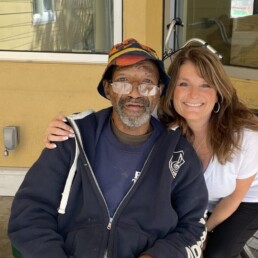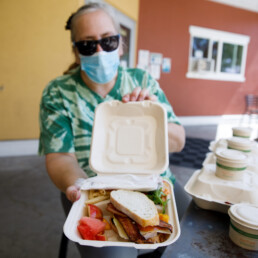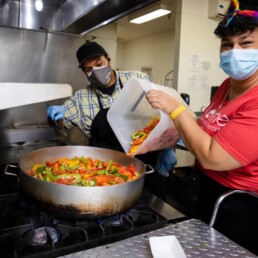Safety. Compassion. Recovery.
COTS Recuperative Care (RC) is a short-term, residential program that provides individuals experiencing homelessness a safe, welcoming place to heal from illness, injury, or surgery. With onsite health care coordination and intensive case management, COTS Recuperative Care focuses on health stabilization, promoting client self-sufficiency, and supporting our clients’ health and housing goals.
Why is Recuperative Care Important?
Effective recuperative care reduces dependence on emergency rooms and law enforcement, reduces hospital readmissions, and provides more opportunities for people experiencing homelessness to get connected with supportive services and secure permanent housing. One night in Recuperative Care costs $208—a massive savings compared to an inpatient night in the hospital or nursing facility
After Recuperative Care,
86%
of clients transfer to shelter, care facility or housing

“This shelter helped me. this shelter showed me how to live.”
– James, former COTS Recuperative Care client, now housed
COTS has served
161
clients in Recuperative Care since 2020

“I love the fact that the kitchen always serves fruit, vegetables, and salad along with the main meal as a complete meal is crucial for my healing process.”
-Ahmed S, former COTS Recuperative Care client, now housed
COTS Recuperative Care program is
25x less expensive
than spending a night in the hospital

“I am so grateful to have such well thought out healthy meals, I couldn’t heal properly without them.”
– Linda G, former COTS Recuperative Care client, now housed
• Hospital beds with privacy curtains
• Locked storage for personal belongings
• ADA bathroom and shower
• Meal Service provided by Mary’s Table and Ceres (medically-tailored meals)
• Toiletries, clothing, earbuds, phone chargers and other needed items
• Laundry facilities and business center in Mary Isaak Center
• Access to Petaluma Health Center medical providers onsite three days a week
• Peer Mentors assigned at intake
• Recuperative Care Specialists onsite daily to help schedule medical appointments, refill and pick up prescriptions, apply for benefits, build life skills, connect to community resources, and obtain documents of identification to get the client ‘housing ready’
• Individual is an adult (age 18+)
• Individual is experiencing homelessness, at-risk of homelessness, or their current home is inaccessible or unsafe due to lack of in-home support.
• Individual has an acute medical condition from which they can recover and/or a currently unmanageable chronic condition that needs to be stabilized.
• Individual is independent with Basic Activities of Daily Living.
• Individual is able to take their medications independently and as prescribed.
• Hospitals
• Medical providers (health centers, community clinics, primary care)
• Skilled nursing and other medical facilities
• Homeless service providers (Community-Based Organizations, street outreach teams)
• Social service programs
• Managed Care Organizations (i.e. health insurance providers)
Lassar Health and Wellness Center
900 Hopper Street Petaluma, CA, 94952
• How long can I stay in Recuperative Care?
90 days. However, clients typically stay anywhere from four-to-six weeks. The length of stay is determined by RC staff and your medical providers.
• Do I have to stay in the Recuperative Care unit the entire time?
No. You can come and go as you please, but there is a 10pm curfew at Mary Isaak Center, and clients are expected to remain inside until 6am. We also encourage you to rest and recover as much as possible, as this is what you are in Recuperative Care to do!
• Can I have nights out while in Recuperative Care?
No. The point of Recuperative Care is to rest and recover. Nights out will only be approved under special circumstances. Hospitalization is the only exemption to this policy.
• Can I bring my pet with me?
Sorry, we don’t allow pets/animals in Recuperative Care. If you have a pet, we have a partnership with North Bay Animal Services who may board your pet while you’re in Recuperative Care. It’s right next door to Mary Isaak Center and you can visit with your pet there.
• Can I park a vehicle onsite?
Yes. The vehicle must be operational (no tow-ins). It also must be registered with the DMV, and we require vehicle owners to have car insurance and a valid driver’s license. No RVs, trailers or boats can be parked onsite at Mary Isaak Center.
• Can my partner/spouse, children or parents visit me?
Yes, but we do not allow guests inside the Recuperative Care unit (unless they are performing caregiving tasks for you). You can visit with your guests downstairs in the lobby or outside on the patio. You are also welcome to go off-campus with them to visit.
• What am I expected to do while in Recuperative Care?
First and foremost, rest and recover! Secondly, we expect clients to follow their medical treatment plan (go to doctor appointments, take medications as prescribed) and to sit down with their care manager regularly to work on their health and housing goals. We also expect clients to be kind and considerate of their roommates and courteous to RC staff.
• Do I have to be sober while in Recuperative Care?
While we recommend clients refrain from drug and alcohol use so it does not impede their healing process, Mary Isaak Center does not require sobriety for participation in its services. However, drugs and alcohol may not be on anywhere in the building or on campus, and if someone’s off-campus use causes a disturbance in Recuperative Care or interferes with their work with case management, the client will be encouraged to consider accepting recovery services or they may be exited from the program.
• I have an oxygen concentrator. Can I use it in Recuperative Care?
Yes.
• I have a criminal record. Is this a problem?
Having a criminal record does not prevent you from coming to Recuperative Care. Registered sex offenders will be considered on a case-by-case basis. We also may not accept someone with an active warrant for their arrest. The circumstances of your legal issues and the nature of the offenses will be considered.
• Is there a doctor or nurse on staff in Recuperative Care?
No, Recuperative Care does not have clinical staff. However, Petaluma Health Center has a nurse practitioner and/or physician onsite three mornings a week for primary care, and we encourage home health nurses and physical therapists to visit Recuperative Care clients.
• Will Recuperative Care staff drive me places?
You will have a variety of transportation options available to you. RC staff will arrange transport to your medical appointments. Otherwise, we’ll help you coordinate using public transportation or other ride services, and we will provide bus passes for you to run personal errands. RC staff may drive you in their personal vehicles if it’s urgent or if you need our support.
• I can’t get out of bed and into my wheelchair without assistance. Can RC staff help me?
Unfortunately, no. As much as we’d like to assist, licensing regulations do not allow Recuperative Care staff to provide hands-on assistance. All clients must be able to perform their Activities of Daily Living (ADLs) independently, such as toileting, bathing, dressing, eating, transferring in and out of bed, and taking medications.
• Does Recuperative Care have staff onsite 24/7?
No. Currently, Recuperative Care staff are onsite daily from 7:30am to 6pm. Shelter staff and security are at the front desk downstairs at Mary Isaak Center in the evening and overnight. They can assist you with urgent needs when RC staff are unavailable.
• I do not have health insurance. Am I still eligible for Recuperative Care?
Yes. Health insurance is not required to receive Recuperative Care services. If you do not have health insurance, RC staff will help get you enrolled in Medi-Cal once you are in Recuperative Care. Hospital patients may have this enrollment process started in the hospital as well.
• How do you determine when I’m ready to transition out of Recuperative Care?
The RC Team evaluates your progress weekly and considers recommendations from your health care providers. You will be notified at least 48 hours in advance of your exit, and we’ll work with you to find your best exit destination. Many clients exit to shelter or interim housing to continue working toward permanent housing.
• Do I go into housing after Recuperative Care?
Permanent housing is the ideal exit location, but that’s not always possible to achieve in 90 days. Many clients exit to the main shelter downstairs at Mary Isaak Center where they can continue working on finding housing for up to six months. Other clients go to live with family, go to Sober Living Environments (SLEs) or another temporary housing situation, or if they require a higher level of care, it’s possible that they will transition to a care facility. RC staff work with you on your housing goals to get you where you want to go.

Thank you to our partners: